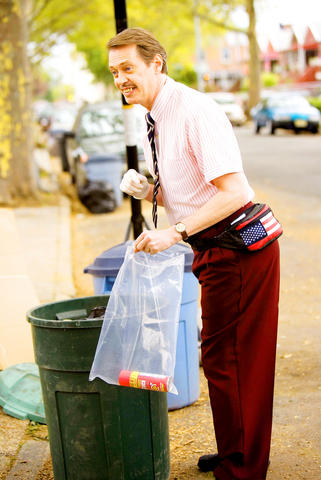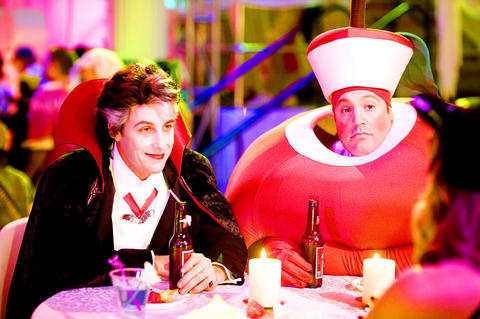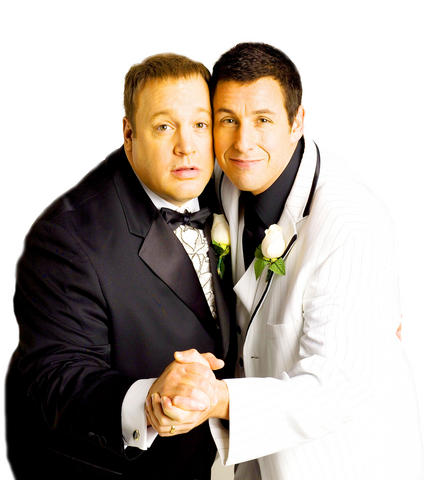Sporadically funny, casually sexist, blithely racist and about as visually sophisticated as a parking-garage surveillance video, the new Adam Sandler comedy, I Now Pronounce You Chuck & Larry, looks, sounds and moves like most Adam Sandler comedies. In other words, once again Sandler plays a regular Joe, here called Chuck, who stands around in the middle of the frame smirking and making fun of other people. Sometimes he makes you laugh, sometimes he makes you wince, though usually he makes you wonder how many times and in how many different permutations he will recycle his obnoxious Everyman.
Sandler's romantic foils have included Drew Barrymore, Emily Watson and Kate Beckinsale; here, the lucky lady is Chuck's bosom buddy and fellow fireman, Larry. As played by an agreeable, sympathetic Kevin James (from the sitcom The King of Queens), Larry comes equipped with a widower's broken heart, two young children and, like Chuck, a firm grasp on his heterosexuality. After he and Chuck experience a near-miss in a smoldering Brooklyn building, though, he decides that the best way to ensure his children's future is to marry his best friend, which is the one and only reason this movie was made. Heterosexuality can be played for comedy or tragedy, sure. But homosexuality? Honey, that's a scream.
That, in any event, is the approach taken by the director, Dennis Dugan, working from a screenplay credited to the bizarre triumvirate of Barry Fanaro, whose credits include years of working on the sitcom The Golden Girls, and Alexander Payne and Jim Taylor, who together wrote Sideways, Election and About Schmidt. It's next to impossible to reconcile Payne and Taylor, who excel in sharply honed, intelligent satire, with the crude laughs and nyuck-nyuck physical high jinks that characterize Chuck & Larry, much less the relentless barrage of idiotic jokes about gay men, most of which hinge on sex, or rather straight male fear of such sex, and involve groaning puns about backdoors and the like.

photos: courtesy of UIP
Fear of a gay planet fuels plenty of American movies; it's as de rigueur in comedy as in macho action. But what's mildly different about Chuck & Larry is how sincerely it tries to have its rainbow cake and eat it too. In structural terms, the movie resembles a game of Mother May I, in that for every tiny step it takes forward in the name of enlightenment (gay people can be as boring as heterosexuals), it takes three giant steps back, often by piling on more jokes about gay sex (some involving a priceless Ving Rhames). Into this mix add the stunningly unfunny Rob Schneider, who pops up brandishing buckteeth, glasses and an odious accent in apparent homage to Mickey Rooney's painful, misguided turn as the Japanese neighbor in Breakfast at Tiffany's.
I Now Pronounce You Chuck & Larry has been deemed safe for conscientious viewing by a representative of the Gay & Lesbian Alliance Against Defamation, a media watchdog group. Given the movie's contempt for women, who mainly just smile, sigh and wiggle their backdoors at the camera, it's too bad that some lesbian (and Asian) Glaad members didn't toss in their two cents about the movie. If Sandler dares speak in favor of gay love in Chuck & Larry - at least when it's legally sanctioned, tucked behind closed doors and not remotely feminine - it's only because homosexuality represents one type of love among men. Here, boys can be boys, together in bed and not, but heaven forbid that any of them look or behave like women.



On April 26, The Lancet published a letter from two doctors at Taichung-based China Medical University Hospital (CMUH) warning that “Taiwan’s Health Care System is on the Brink of Collapse.” The authors said that “Years of policy inaction and mismanagement of resources have led to the National Health Insurance system operating under unsustainable conditions.” The pushback was immediate. Errors in the paper were quickly identified and publicized, to discredit the authors (the hospital apologized). CNA reported that CMUH said the letter described Taiwan in 2021 as having 62 nurses per 10,000 people, when the correct number was 78 nurses per 10,000

As we live longer, our risk of cognitive impairment is increasing. How can we delay the onset of symptoms? Do we have to give up every indulgence or can small changes make a difference? We asked neurologists for tips on how to keep our brains healthy for life. TAKE CARE OF YOUR HEALTH “All of the sensible things that apply to bodily health apply to brain health,” says Suzanne O’Sullivan, a consultant in neurology at the National Hospital for Neurology and Neurosurgery in London, and the author of The Age of Diagnosis. “When you’re 20, you can get away with absolute

May 5 to May 11 What started out as friction between Taiwanese students at Taichung First High School and a Japanese head cook escalated dramatically over the first two weeks of May 1927. It began on April 30 when the cook’s wife knew that lotus starch used in that night’s dinner had rat feces in it, but failed to inform staff until the meal was already prepared. The students believed that her silence was intentional, and filed a complaint. The school’s Japanese administrators sided with the cook’s family, dismissing the students as troublemakers and clamping down on their freedoms — with

As Donald Trump’s executive order in March led to the shuttering of Voice of America (VOA) — the global broadcaster whose roots date back to the fight against Nazi propaganda — he quickly attracted support from figures not used to aligning themselves with any US administration. Trump had ordered the US Agency for Global Media, the federal agency that funds VOA and other groups promoting independent journalism overseas, to be “eliminated to the maximum extent consistent with applicable law.” The decision suddenly halted programming in 49 languages to more than 425 million people. In Moscow, Margarita Simonyan, the hardline editor-in-chief of the